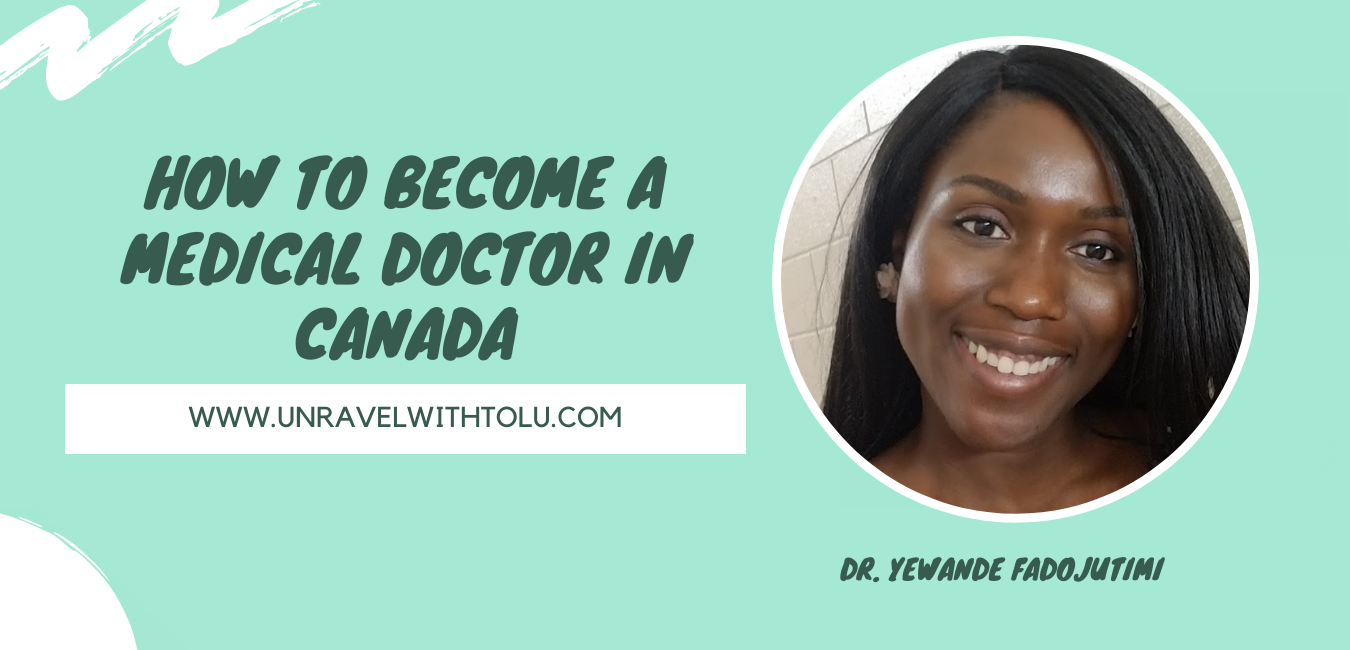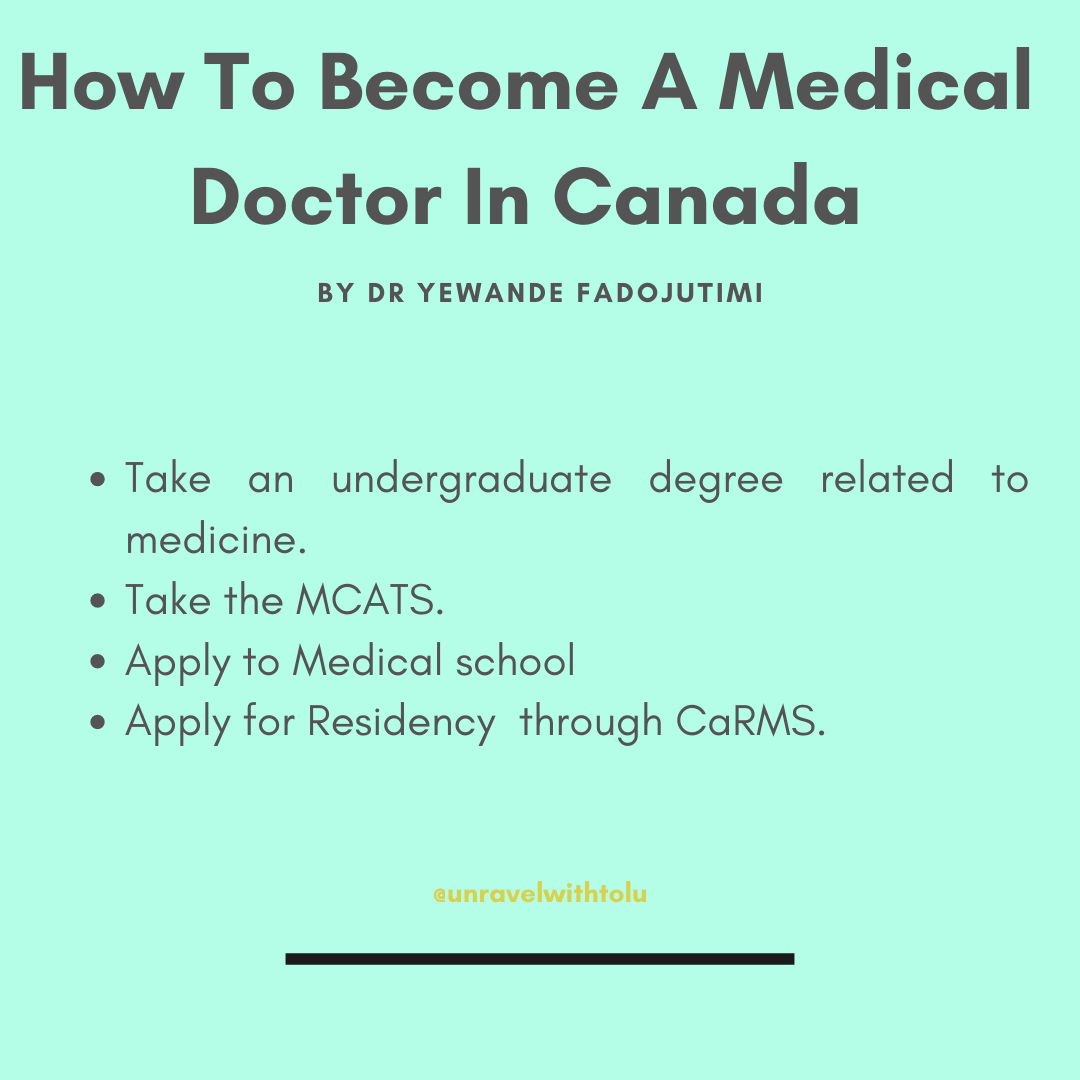
A medical career is a very rewarding career that takes years of practice and a lot of financial investment. The path to becoming a medical doctor in Canada can be unclear, in particular, to internationally trained medical doctors who want to practise in Canada and international students who want to pursue a career in medicine. I decided to bring Dr. Yewande Fadojutimi to share how she became a medical doctor in Canada. She helps shed some light on the process of becoming a doctor in Canada. Below is the full interview with Dr. Yewande Fadojutimi.
Introduce yourself
I’m Dr. Yewande Fadojutimi. I’m an Emergency Room (ER) physician. I’m a wife and mother of 2. I’ve been a doctor for 10 years, including 3 years of residency. I’m also a blogger who loves to write about finances and personal development. My website is yeyefadoju.org. You can also find me on Instagram @dr.yewande inspiring moms in Canada to manage their money confidently, live debt-free and build wealth for themselves and their children.
Talk about your journey of being a doctor
People often ask me if I always wanted to be a doctor. The answer for me is, no. I wanted to be a teacher! I can’t pinpoint exactly when I decided to be a doctor, to be honest. All I know is that by the time I was in the 3rd year of University I was studying for the MCAT and applying for medical school.
My first degree is a double major in Biology and Psychology from McMaster University, Hamilton (4 years). My medical degree is from the University of Toronto (4 years). Back then there was only one U of T med school campus – Downtown and I loved it! I completed my residency in Family Medicine with a focus in Global Health, also from the University of Toronto (2 years), and then went on to the University of Manitoba for my fellowship in Emergency Medicine (1 year).
I have been a practising Emergency Medicine physician for 7 years. I have worked in Toronto, Markham, Uxbridge, Lion’s Head, Yellowknife and Winnipeg. Internationally I’ve worked in hospitals/health care settings in Nigeria, Malawi and Cameroon. It’s been quite the journey! I am currently transitioning back to work in Toronto after being in Winnipeg for 7 years.
How did you cope with reading and studying while in medical school?
I love learning and studying. That really helped me get through all the reading in medical school. Even though I sat in the back row, I attended classes and paid attention (most of the time… sometimes I was caught dozing off).
I read my notes over and over without distractions and used lots of coloured pens and highlighters. I summarized my notes and explained things to myself out loud. To memorize difficult words or concepts, I used learning tricks my mother (also a medical doctor) taught us growing up. For example, I would make up songs or stories, or I would make a mental connection between familiar items around my apartment and medical terms. This made studying fun and like a game. Although I prefer to study alone, I leaned on the support of my close friends and classmates for motivation and encouragement when things got really hard.
Asides, being an ER doctor, I see you enjoy personal finance, especially for moms. Tell us more about it.
I personally started learning about finances because I felt I could be managing my money better. But I just could not keep the information I was learning to myself. This is why I blog about it, I share about it on social media and I coach women on it. I highlighted the 10 most common money mistakes I’ve seen people make here. I also discussed how to avoid them.
Moms sacrifice so much for their families. I want them to be free to live out their God-given purpose without the chains of financial burden holding them down. I’m not only an advocate for physical wellness but an advocate for financial wellness too.
What are the steps required for one to take in order to qualify as a medical doctor in Canada?
The most “straightforward” way of becoming a Medical Doctor here in Canada is to graduate from a University here, apply for medical school in Canada, then apply for a residency program through CaRMS (Canadian Resident Match Service).
The next way to become a medical doctor here is to complete medical school outside of Canada and apply for a residency program through the Canadian Resident Match Service (CaRMS).
And finally, there are certain provinces that specifically recruit International Medical Graduates who have already worked as doctors in their home country. They are recruited into a special stream of training. It’s not residency but a shorter learning period, to get used to working in Canada, before launching out to practice.
How did you prepare for the MCAT exam? And what resources helped you?
I wrote the MCAT back in 2005 when it was offered just twice a year and everything was still on paper. Thankfully, I was able to dedicate the entire summer (3 or 4 months) that year to study. I also invested in a preparatory course called the Princeton Review. I attended classes 5 days a week and spent the rest of my time in the library studying until it closed.
The MCAT is not just a knowledge test. You can have all the knowledge memorized and still do terribly on the exam. The questions are phrased such that a single word can make an answer incorrect. This is why it is essential to do practice tests over, and over again. And also go through the explanations for the answers. When you do this, you will be able to recognize the pattern of questioning and identify the tricks that are inserted into the answers. The MCAT also tests your stamina. It is a long exam. 8 hours long, including a few short breaks.
In addition to studying, intentional practice was key to my success on the MCAT. I timed myself and simulated the exam atmosphere 4 or 5 times before the exam itself. And of course, I prayed very hard too.
Although it is not ideal to take the MCAT multiple times, I know someone who took the MCAT 6 times and currently practices as a successful physician.
Related Post
Career Alternative For Foreign-Trained Lawyers In Canada
Preparing To Study Abroad With Ile Iwe
Requalifying As A Lawyer In Canada | Call to the Ontario Bar
How easy it is for an international medical graduate to get a residency slot?
Easy is relative. It depends on what specialty you are aiming for. A specialty with more demand such as Family Medicine will offer a higher chance than a specialty with lower demand such as Ophthalmology.
It also depends on what province you’re in. There is more competition in provinces like Ontario and British Columbia than provinces like Nova Scotia and Saskatchewan. At the time of this writing Manitoba, Saskatchewan and Alberta have programs specifically for IMGs. These aren’t residency programs though.
What happens when you fail medical school?
It’s very difficult to completely fail medical school. The hardest part is getting in! But once you’re in, there is so much support to make sure you graduate, even if it means taking a break to cope with various stressors that come with life. Remediation of any failed exam is also offered to make sure you make it through to graduation.
Don’t get me wrong, medical school is TOUGH! I have lots of grey hair to prove it. But once you’re in, it will take a serious ethical violation to get you kicked out.
Did you have to work in the hospital as a clinical associate or any other supporting role before being able to practice?
During medical school, we start seeing patients in a clinical setting (a clinic or a hospital) almost immediately. As you advance from being a medical student to a resident (doctor-in-training), your responsibilities when it comes to patient care increases.
Bear in mind that residents are doctors too. After all, they have graduated from medical school, they have an M.D. and are being paid (peanuts for the work that they do). But their medical license is a restricted license that can only be used for learning purposes. They still need to run their treatment plan by the staff/attending physician who is supervising their learning.
What are the job opportunities/salary expectations for doctors in Canada?
Job opportunities depend on your specialty. There is always a need for family doctors no matter where you are in the country. This is especially true for more remote and under-serviced locations. And you can open up a clinic anywhere.
It’s a bit complicated for specialists, especially those who require a hospital to practice. For example, a surgeon needs an operating room to work. Operating room time is a limited resource (there are only 24 hours a day, a certain number of machines, trained nurses etc), so a hospital can only hire a fixed number of surgeons. And doctors don’t like to retire, so an 80-year-old can operate until she drops. As long as it’s safe to do so, of course! Although the country needs more specialists, the resources required for their work makes their “demand” lower.
As a doctor, your pay is generally determined by how much you work. I know emergency physicians and family doctors who make far more than specialists. They work hard to earn their pay. They may also work in locations that desperately need their services, therefore they get compensated well.
What province is the best for medical doctors?
This really depends on your needs. Manitoba is great – lots of work and affordable cost of living relative to income earned. Ontario is great – easy to access other countries for travel, diverse, lots of opportunities for other ventures outside of medicine.
What resources and support groups are available for immigrant doctors?
Canadian Association of Nigerian Physicians & Dentists (CANPAD) is a great resource for networking.
What advice would you have wanted before starting medical school in Canada?
Journal! Document your journey. Every rotation, every oral exam, every patient encounter will seem SO significant when you’re in school, but you won’t remember any of it in 10 years.
Is there anything noteworthy about the way medicine is practiced in Canada that you think people considering taking the path you took should know?
It’s not enough to just write a prescription. Discuss why to make sure they understand the side effects and let them know it’s okay to return to the clinic or hospital if they are feeling worse.
Communication is crucial. Not just verbal, but written communication as well. You don’t need to write essays, but let your thought process be visible in black and white, such that anyone reading it can see why you went down the treatment route that you did.
What advice would you want to give the new students about to start medical school?
Imposter Syndrome is very common amongst women, minorities and immigrants. This is when you feel like you don’t belong, or that you got where you are by luck, or that someone is going to find out that you “really don’t know what you’re talking about.”
Listen, you 100% belong there. In fact, walk around the clinic or hospital or classroom like it’s your father’s house. Do not allow anyone to intimidate you. Answer the questions you are asked by your teachers boldly. You already know the answer. And if you don’t just say, “I don’t know the answer yet, but I’m committing to reading about it tonight.” Then go read. You’ve got this!
post a comment
You must be logged in to post a comment.


Choko_l
Another great post that I’m sure will address the questions of aspiring doctors and new doctors alike. In short, anyone will learn a thing or two from this post. Thanks for sharing this, Unravelwithtolu.
Unravel with Tolu
Thanks, Choko_l
Ada
This was an informative read. Thanks Dr. Yewande.
Unravel with Tolu
Thanks, Ada
Adanna Akobundu
thanks for this! so from what she said, a fresh graduate who hasn’t completed their internship doesn’t stand a chance. Right?
Unravel with Tolu
Internship or Residency?
Pingback: Financial Tips For Newcomers To Canada - Unravel With Tolu